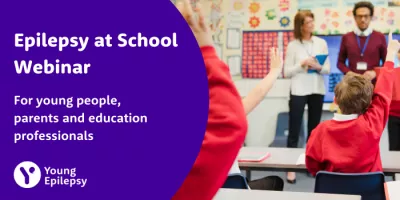Children with epilepsy are at a greater risk of learning and behavioural difficulties than children without epilepsy. Despite this, there is a lack of research exploring the views and experiences of young people with epilepsy, their parents and school staff with regards to educational supports that could aid learning in children with the condition.
What we wanted to know
- The impact of epilepsy on school functioning according to children with epilepsy, their parents and school staff (e.g., school attendance, achievement and social relationships).
- The current and desired educational support for young people with epilepsy.
What we did
A total of 68 children with ‘active’ epilepsy living in the area of West Sussex participated in our study. These children, along with their parents and teachers were asked a range of questions via a questionnaire or focus group. These questions explored the impact of epilepsy on a range of aspects including learning and behaviour, emotional wellbeing and sleep.
Key findings
Educational and therapeutic provisions:
- All children with epilepsy should have an Individual Healthcare Plan (IHP). However, only 68% of our sample reported having one. 57% of children had an Education and Healthcare Plan (EHCP).
- Whilst approximately half of respondents have/had received therapeutic support (i.e., speech and language therapy, occupational therapy, physiotherapy, psychological assessment), parents particularly noted the challenges of obtaining educational supports and therapeutic provision for their child and indicated desire for changes to current processes (e.g., better communication between home and school, additional resources to support behaviour and emotions)
Inclusion:
- 90% of parents and 93% of teachers agreed that children with epilepsy were included in all classroom activities, with some adjustments needed to ensure full participation. Despite this, parents of children in special schools were more likely to agree that their child was included in school than parents of children attending mainstream schools.
- Some children felt that their epilepsy affected their friendships and, in some cases, has resulted in them being bullied.
Learning and behaviour:
- Parents and teachers believed that epilepsy impacted the child’s learning and behaviour, particularly in the areas of memory, concentration and emotional reactivity.
- Participants noted several ways learning could be supported in the classroom including adjustments to tasks, increased adult support, rewards and incentives
Sleep:
- 56% of children who responded believed that epilepsy affects their sleep.
- 65% of parents believed that their child had more difficulties with sleep than other children of their age, with 95% believing that the difficulties impacted the child’s learning and behaviour.
- 54% of school staff believed that the child with epilepsy they supported was more tired/fatigued than peers, with 86% of school staff believing that the child’s increased tiredness affected their learning/behaviour.
Staff knowledge:
- School staff exhibited limited knowledge of the correct actions in the event of seizures. Knowledge of the relationship between epilepsy, anti-seizure medication and learning and behaviour was also deficient.
- Knowledge about and attitudes towards epilepsy were better among staff in special schools, staff who had previously witnessed a seizure and in those who had been in receipt of training.
- School staff were most concerned about teaching a student with epilepsy, compared to eight other neurodevelopmental/medical conditions.


